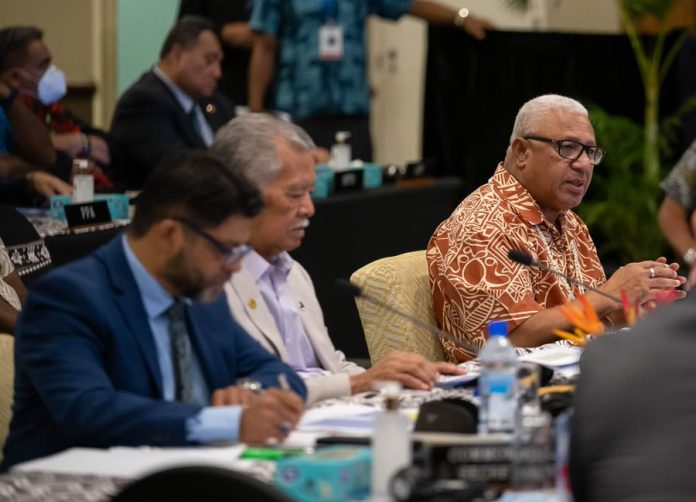By Pita Ligaiula
As the Pacific emerge from the grip of COVID-19 our region remain in a state of turmoil, says Fijian Prime Minister and Chair of the Pacific Islands Forum.
In his opening remarks at the 51st Pacific Islands Forum Dialogue with Associate Members and Forum Observers in Suva Tuesday, Voreqe Bainimarama said many countries continue to deal with long standing socio-economic challenges that have been exacerbated by the pandemic.
“Our sources of revenue have been hit hard, while our communities and public health systems have been heavily impacted.
“We continue to deal with a runaway climate change crisis, in which we will soon find ourselves on the brink of no return.
“Climate change is hurting our peoples’ security and livelihoods. It is damaging our economies, and in many instances, it is threatening our very sovereignty, as climate-induced sea level rise threatens our EEZs,” explained Bainimarama.
On top of this, the global geo-political landscape is hotly competitive, as we see a multi-polar system emerge featuring major superpower rivalry, alongside a number of middle powers all clamouring to shape the world in their favour. We have seen this in our region over the past few months, he said.
Added to this, Bainimarama said the Russia and Ukraine war has further complicated global political and economic stability.
“Our economies, already hit hard by the COVID-19 pandemic, must now contend with the added economic impacts of this conflict.
“By way of balance, we have many strengths and many opportunities as individual countries and as a region.
Our people are youthful and innovative. Our cultures provide natural resilience and social protection to buffer the shocks we face. We have significant natural resources on land, and particularly in our ocean,” he said.
Bainimarana also acknowledged the ‘breakdown in communication’ with the Micronesian bloc.
“I acknowledge again the breakdown in our connections over the past two years. My hope is that through our dialogue mechanism, and the resolutions that we are working towards, that you continue to find value and indeed belonging within the Forum family.
There are lessons we can learn from our predecessors this week. Starting with the nurturing of our relationships with one another and that we re-establish our bonds and our connections,” he said.
Bainimarama said the region need a vision and a plan on how will they choose to navigate these challenges.
“The success of the 2050 Strategy begins and ends with us, Leaders. If our ancestors were the architects of Pacific regionalism, we are its custodians. It is the quality of our dialogue, debate and the direction that we offer that will determine the success of the Strategy, and the direction of Pacific regionalism more broadly,” he explained.
Bainimarama said this 51st Forum is an opportunity for them to put a stake in the ground.
“It is an opportunity for us to declare – that as a family united, we will come together, we will seize our shared opportunities, we will leverage our shared strengths and resources, and we will combat our challenges together.
“It is an opportunity for us to declare – that business as usual can no longer be our way.
It is an opportunity for us to declare – to our youth that we will fight for their survival, their security, and their prosperity; and It is an opportunity for us to declare – to the world around us, that we are the Blue Pacific Continent, we are the owners and the custodians of these lands and this ocean, and we will work together to secure, protect and leverage our resource for ourselves and our generations to come,” said Bainimarama.
Forum Secretary General, Henry Puna said the meeting will be an opportunity to consider the global context in which the Pacific operates and its implications for the region and regional priorities.
“Our region continues to face enduring and endemic challenges and vulnerabilities that have in many instances been significantly exacerbated by climate change, and COVID-19. These realities are complicated by a dynamic and shifting geopolitical landscape that we have no option but to engage with. In summary, our region remains in a precarious position, both in the short and in the long term,” he said.
Puna said the leaders consideration of the 2050 strategy this week will become the guiding document as the Pacific look to secure its future and reposition themselves in an evolving global context.
“To our representatives on the panel, I look forward to hearing your remarks and particularly how you intend to partner with the Pacific in delivering the 2050 strategy. While leaders will consider the final document in two days time, I encourage you to work with us as we plan to implement the necessary structures to fulfill our goals and milestones over the next three decades,” said SG Puna.
SOURCE: PACNEWS













